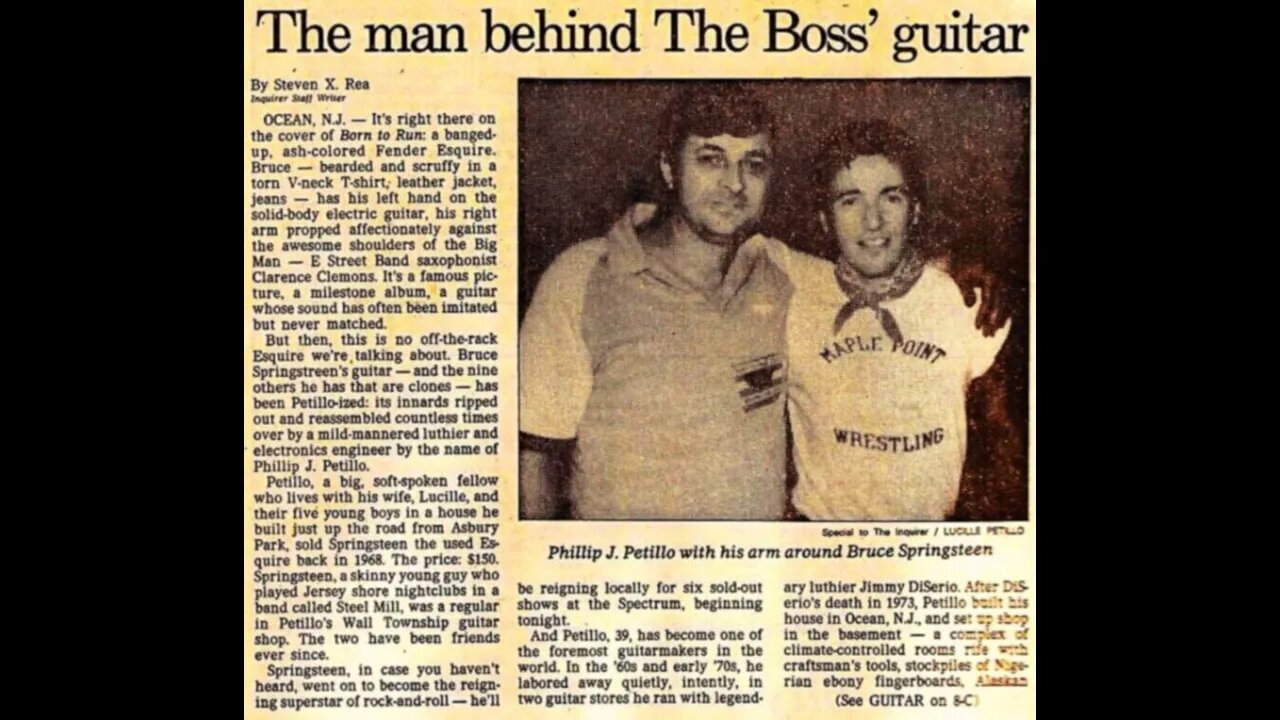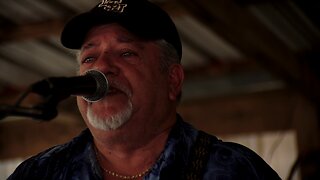Premium Only Content

Phil Petillo
Birth name Phillip J. Petillo
Born September 4, 1945
Origin United States
Died August 13, 2010 (aged 64)
Occupation(s) Luthier
Website www.petilloguitars.com
Phillip J. Petillo (September 4, 1945 – August 13, 2010)[1] was an American luthier. In the 1970s he built prototypes for Travis Bean and Gary Kramer for what would become Kramer Guitars.[2]
Education
Petillo's educational training included a Bachelor of Science degree in Industrial Engineering from Columbia University (1967), a master's degree in Industrial Science from LaSalle University (1969). He later received an honorary bachelor's degree from Eastern Virginia Graduate School of Medicine (1984) and a PhD in Engineering Technology from LaSalle University (1990). he was an apprentice of John D'Angelico and also of D'Angelico's, Jimmy DiSerio.
Career
Aside from his guitar making, he was also the former Director of Engineering at Millennium Cell Inc. and designed and invented hydrogen fuel cells known as Hydrogen On Demand, hydrogen from sodium borohydride generators for DaimlerChrysler. Even after the developing company Millennium Cell closed in 2008, Petillo continued with the product.[3]
Patent
In the guitar circle, Petillo is most famous as the inventor of the "Petillo Precision Fret." In a patent filed on June 22, 1976, the new fret was described as "a substantially T-shaped fret for a stringed instrument which has an elongated stem topped by a triangularly shaped cap." Petillo's triangular frets result in more precise intonation; however, not all guitarists are comfortable with their rigid feel. The Revolutionary Drumstick Patent of Petillo was sold to Ambico at the NAMM Convention in GA, 1977[4]
Manufacturing
In 1970, Dennis Berardi and Gary Kramer asked Phil Petillo Master Luthier-Engineer to design and build 4 prototypes of a new neck made out of aluminum and wood.[5] When Berardi and Kramer first came to the Petillo Home Workshop, they offered the guitar to be called PETILLO and Phil refused for he knew from past experiences in the Music Industry that often one loses one's good name with such offers that are appealing when the need demands it. Petillo designed the guitar with a forked headstock. When La Placa and investor Henry Vaccaro joined forces to open a plant in Neptune, New Jersey, they needed Petillo. The first four prototypes of Kramer Guitars were hand made in 1976 at the 1206 Herbert Ave. Ocean, NJ Studio Workshop by Phil Petillo. These unique guitars were photographed for the first Kramer Brochure that was introduced at the 1977 NAMM show in Chicago, Illinois in 1976.[6] At that show, the fledgling guitar company sold $250,000 based on the interest generated from the 4 prototype guitars. Ironically, they had no guitars since the factory had yet to be set up. Petillo helped design and set up the factory located in Neptune and proceeded to build the First Fingerboard Machine that cut the slots in all fingerboards to Petillo's Trade Secret Scales with Perfect Intonation. These designs and prototypes were kept in a guarded Safe in Dennis Berardi's office at the Neptune Factory.
By the time the next NAMM show, one year later in Atlanta, GA 1977, after Petillo organized the factory, set up, scaled fingerboards, then he was pushed out. Petillo saw things in the factory that were compromised for profit that he could not tolerate as a Luthier of the highest ethical standards. Due to extreme differences regarding payment and quality control, La Placa, Berrardi et al. forced Petillo out after he had given the supreme sacrifice of his own business with Total Responsibility for completing this intense project of design, building from scratch these four guitars that were used to get endorsements from Stanley Clark and others in his home workshop, witnessed by his wife business partner, Lucille Petillo that propelled the Kramer Company under BKL to early success. Later they also eliminated Gary Kramer. Petillo did not receive compensation but instead was methodically forced out after all of his contributions that started the company. Their unethical behavior after Petillo organized the production of the first Kramers keeping quality control as a priority was unethical. Factory quality violations in Neptune, New Jersey plus lack of payment for his contributions of designing, building, and quality control along with disagreements with Peter LaPlaca and Lucille Petillo, Phil was forced out of the company. An article was written by Phillip and Lucille Petillo that appeared in the NAMM issue of Musical Merchandise Review describing in detail how these unique guitars were made featuring the construction of the Kramer Neck. (MMR Issue,
I believe Phil restored the cabinets in the white house also right?
-
 10:02
10:02
Music
1 year agoPhil Collins Music
22 -
 8:31
8:31
mwlinscheid
2 years agoDr. Phil Demented!
110 -
 2:33
2:33
VALEN PRODUCTIONS
1 year agoPhil Richard Jambalaya 2014
4 -
 4:47
4:47
Gene Decode
2 years agoPhil G 10-24-22
2.07K12 -
 16:39
16:39
EBS - NESARA GESARA - QFS
2 years agoThe Phil Godlewski Bombshell!!
6904 -
 0:10
0:10
ChadAndrews
2 years agoPhil Hall
2 -
 1:16:30
1:16:30
Edge of Wonder
8 hours agoLA Fire Updates: Miracles Amidst the Devastation
39.1K13 -
 54:54
54:54
LFA TV
12 hours agoBanning Mystery of the Ages | TRUMPET DAILY 1.17.25 7pm
33.3K7 -
 1:47:13
1:47:13
2 MIKES LIVE
6 hours ago2 MIKES LIVE #168 Open Mike Friday!
29K2 -
 1:05:11
1:05:11
Sarah Westall
7 hours agoMysterious Fog and California Wildfires Both Contain Dangerous Elements w/ Dr Robert Young & Hazen
51K7